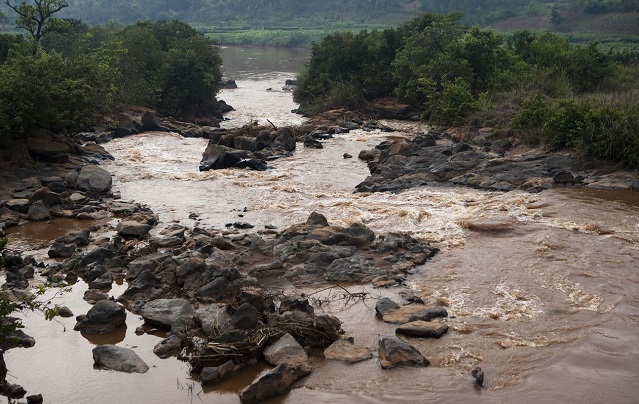Supporting climate-smart communities in the Cubango-Okavango River Basin

The IKI Small Grants project supports the Permanent Okavango River Basin Water Commission (OKACOM) in Botswana, Namibia, and Angola to implement a call for proposals in the mentioned countries that invites projects to enhance community adaptation through climate smart practices. The initiative supports innovative projects with potential to strengthen community-based livelihoods demonstration which include conservation agriculture, sustainable community fisheries management and climate smart horticulture production. It is expected that those projects will reduce soil degradation and biodiversity loss while increasing food security.
INITIAL SITUATION
The Cubango-Okavango River Basin is a transboundary basin with a network of river systems traversing through Angola, Namibia, and Botswana. It has outstanding biodiversity hotspots threatened by climate change and clearing of land for agricultural purposes. Slash and burn as well as shifting cultivation practices are common, with farmers frequently moving plots in search for new fertile soils. While shifting cultivation by a single farmer may seem negligible, collective impacts on biodiversity loss and reduced carbon sequestration are significant. The Okavango River is one of the transboundary rivers where fish resources are affected by recurrent low flows attributed to climate variability (low rainfall in the upper areas of the catchment) and overfishing. At the same time, fish contributes to food security and household income. The situation is exacerbated by a lack of harmonized transboundary fisheries resources management and practices.
TARGET GROUPS
Civil society groups in the three OKACOM member states Angola, Botswana, and Namibia can apply for funding during the call for proposals. These groups include including non-governmental organisations, universities, community-based organisations, community-based natural resource management groups, and farmers associations. Local government structures responsible for improving livelihoods and biodiversity conservation will also be considered. As funding institution, OKACOM estimates to finance five small-scale projects. The primary target group comprises rural communities along the Kavango and Cuito Rivers subsisting on local agriculture. Women and economically disadvantaged groups are prioritized.
LATEST PROJECT HIGHLIGHTS AND IMPACTS
- A call for proposals was announced in September 2022 and closed in October 2022.
- During the proposal evaluation process, five projects were selected for funding.
- Stakeholder engagement workshops in Angola and Botswana took place.
PROJECT APPROACH
Based on an open call for proposals, organisations from the three member states were selected to implement projects that support community adaptation to climate change and biological conservation in the river basin through climate-smart practice. The projects build on OKACOM initiatives which include conservation agriculture, climate-smart horticulture production, community-based fisheries management, and community-based conservation tourism.
The focal geographical area is the transboundary Kavango River (bordering the south-eastern Angola and northeastern Namibia), the Panhandle area of the Okavango Delta, and the outlet Thamalakane-Boteti river system in northern Botswana. OKACOM is backstopped by its structure within the member states which include the Water Resources Technical Committee, the Biodiversity and Environment Technical Committee, the Socio-economic Development Technical Committee, and the Okavango Basin Steering Committee.
The call for proposals includes a clearly defined grant scheme with associated grant management tools. It defines objectives that applicants should contribute to, potential approaches to be supported under the project, eligibility criteria for applicant organisations, proposal development guidelines, application procedures, institutional arrangements, selection criteria, evaluation criteria, progress reporting and quality assurance processes and procedures. Advertisement in print and online media in Angola, Botswana and Namibia flanks the call. During the implementation phase, grant management activities include backstopping of sub-grantees, documentation of lessons learnt and good practice, monitoring, and evaluation as well as knowledge exchange (e.g., study visits, conferences) to promote upscaling. The project includes activities on institutional capacity building of OKACOM regarding grant management through the development of standard operating procedures and staff training.
ABOUT THE ORGANISATION
The Permanent Okavango River Basin Water Commission (OKACOM) is a river basin organisation established by the Republics of Angola, Botswana, and Namibia through agreement in 1994. It is a platform that coordinates transboundary water resources’ governance and management of shared watercourse in the Cubango-Okavango River Basin. With support from various international cooperation partners, OKACOM is currently implementing its 20 years Strategic Action Programme which advocates for a Basin Development and Management Framework anchored on four thematic areas which are livelihoods and socio-economic development, water resources management, land management and biodiversity and environment. A strong emphasis is on the demonstration of environmentally-sound socioeconomic development as means of improving livelihoods of rural communities of the basin that are generally languishing in poverty.
